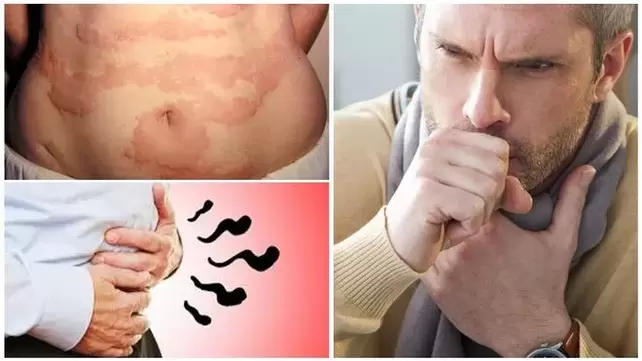Personal hygiene has improved significantly over the past century, but the problem of worms is still relevant not only for rural residents, but also for city dwellers. The statistics clearly show just how high the risk of helminth infections is: one in every third person on the planet is infected with helminths. But this disease does not always manifest clearly, there are cases where the patient cannot accurately interpret the symptoms and stays in the dark for a long time without any treatment. Questions about understanding that you have worms arise both with helminthiasis and other conditions with similar symptoms.

Worms are a broad group of parasitic worms, the main signs of their presence in the human body are similar. Doctors assume that every person at least once in his life is exposed to helminthiasis. Moreover, the presence of helminths in the body can stimulate the development of other diseases, sometimes very dangerous, so the problem of diagnosing this disease is very important.
Mechanism of infection
Worm infections occur in four main ways:
- Water, soil or sand. Soil and water provide ideal conditions for the storage of parasite eggs. A person bathing in water is always at risk of ingesting an egg, which will later turn into an adult. Not as rare as one might think, humans also ingest soil particles, exposing them to the risk of infection. Some types of parasites can enter the body directly through the skin.
- Dish.On the skins of fruits and vegetables that are not washed or cooked thoroughly, worm eggs may be present. Consumption of raw or lightly processed meat, dried fish, dairy products, etc. v. there are many risks.
- Contact with the patient. Direct contact can occur with both sick people and infected animals. Shared activities, living in a common area, close communication contribute to the rapid penetration of the parasite into the intestines and its further development.
- The bite.Worms can be transmitted through an insect bite. It is one of the rarest modes of infection in temperate latitudes, but it is sometimes the cause of disease. In hot countries, this route is more common, which should be kept in mind when vacationing in warm regions.
Symptom
For those who want to know how to understand that they have worms, you should know the principles of recognizing the symptoms. Any symptoms of helminthiasis do not appear immediately after infection but only appear when the parasites stop moving through the digestive tract and begin to develop into adults.
Some signs are due to ingesting toxins that the worm releases during its life. All waste products enter the intestinal lumen, from where they are absorbed into the bloodstream and carried to all organs. Usually there are more signs and they are stronger in superinfection conditions, when the worm population becomes significant. In people who are immunosuppressed or have other chronic illnesses, symptoms get worse over a relatively short period of time.

All signs are divided into two large groups: obvious and hidden. The obvious ones can be assessed independently at home, while the hidden ones can only be determined on an outpatient basis with the help of appointments for certain tests and examinations. certain.
Clearly
The obvious manifestations include symptoms that one can understand that worms are present in the body. Their presence does not cause obvious symptoms, such as occurs with viral growth. Parasites target life inside the body, so an infected host's condition deteriorates too much to be a threat to their life. For this reason, symptoms do not require emergency care.
You can suspect or understand the presence of a helminth infestation by the following signs:
- Losing weight gradually for no apparent reason, continuing for several months, and sometimes for several years in a row. The rate of weight loss is not too dramatic, usually 2-5% per month. Given the high intensity of infection in immunocompromised people, this number can be as high as 10%.
- Digestive tract disorders. Certain types of worms can block the biliary tract or intestinal lumen, causing stable constipation. With high detoxification intensity, on the contrary, recurrent diarrhea may occur. Since the walls of the upper part of the small intestine are inflamed, bloating and gas formation are frequently observed, and bloating is possible.
- Severe pain in joints and muscles. Usually such manifestations are attributed to the development of arthropathy, but in the case of helminths this is due to parasite migration. In addition, such pains can be caused by the effect of the poison on the joints and muscle tissue.
- Itching near the anus. This phenomenon occurs because a large number of parasitic worms come out of the rectum to reproduce and lay eggs. This causes intense itching, which tends to get worse in the evening and at night.
- allergic manifestations. Often a reaction occurs with the presence of a large number of toxins in the blood or due to damage to the intestinal mucosa, causing an increase in the immune system and allergic reactions.
- Pulmonary manifestations. It can range in size, from a persistent cough and ending with pneumonia. Characteristic for severe ascariasis occurring within a period of not less than three months from the time of infection.
- Rising temperatures. Such manifestations can be of varying intensity. Usually, a low temperature of about 37°C lasts around the clock, but in rare cases fever can be observed.

Hide
Hidden signs can only be revealed by a physician who will fully assess the clinical picture and understand that worms may be a possible cause. Prophylactic measures for the diagnosis of helminthiasis are:
- Fecal analysis for worms. It must be submitted in two stages, so experts do not consider the results of an analysis to be reliable. This is due to the cyclicity of the reproductive process, so it is not always possible to understand from a stool analysis that the patient has helminths.
- Clinical blood test. Elevated levels of eosinophils indicate a possible parasite presence in the body. Often such an assumption arises after tests during the treatment or diagnosis of other diseases.
- Antibody analysis. Currently, it is one of the most reliable diagnostic methods that help determine if a person has a worm infection. Despite the fact that it is more expensive than similar drugs, recently doctors increasingly prefer to prescribe it because of its high content of information and reliability.

Antiparasitic drugs or laxatives should not be administered before any clinical test for parasites, as this makes diagnosis difficult.
Signs in a child
In children, the presence of worms is diagnosed more often than in adults. This is caused by poor hygiene, close contact with domestic or street animals, and the underdeveloped immune system. A developing organism is usually more responsive to the presence of a parasite, and the consequences may be more global in adults. But to understand that a child is infected with worms is not very easy. Symptoms can be the same as in adults, but are usually more acute.
In most cases, signs suggestive of helminthic infestation in children are:
- Lose weight quickly. With the running figure, such behavior may delay the child's physical development;
- Deterioration of the quality of hair and nails. It occurs due to a long-term deficiency of nutrients and vitamins due to a violation of the absorption of digested food in the intestine.
- Sleep disorders. The condition can cause a child to wake up more at night, fussing, spinning, and talking in dreams.
- Irritability. Nervous system toxicity and ill health can affect a child's emotional state, causing increased arousal, irritability, rapid tears, etc. v.
- The desire to constantly scratch the anus. The child has no control over the outward manifestations, so this symptom often helps to understand the cause of the illness and the physical changes.

Some parents tend to give their children broad-spectrum antiparasitic drugs as a precaution, but experts do not recommend doing this, as most of these drugs are quite difficult to tolerate. It is better to understand first if the child is infected and what treatment they need, as the therapies for different types of worms vary considerably and are not always effective. effects against helminths of other groups.






































